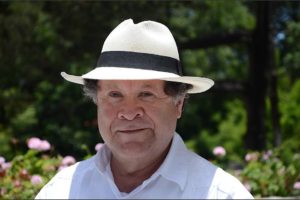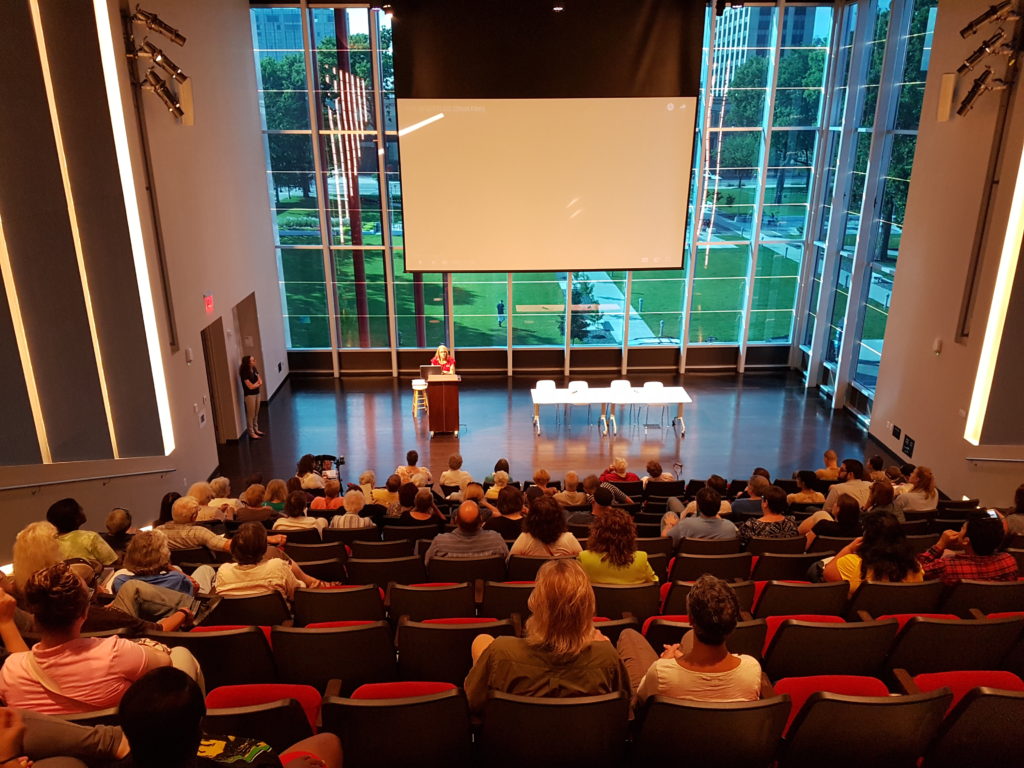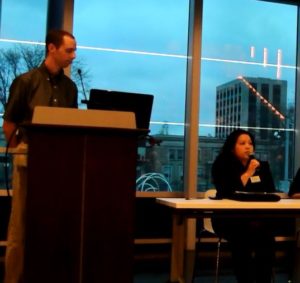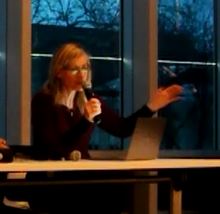
“So, my purpose was to come to Postville for four days, interview a couple people, go back to New York and put all those interviews in a series that I have on YouTube about immigrants. Well, those four days turned into two weeks, and that first trip turned into 29 trips before this film was completed.
The reason that happened is because I met Father Paul and Jennifer Cooley and Sister Mary and the immigrants who you saw in the film. Their stories were so impactful that it made me realize that I didn’t know anything about immigration, even though I am an immigrant myself. And second, that this was a very complicated story that deserved a lot of attention.
Now ten years and three films later, I’m still coming back. And every time I come back, it’s like coming home.”
Filmmaker Luis Argueta, was captivated by the stories in Postville, Iowa, following one of the largest immigration raids in U.S. history. In April, community members gathered at the Cedar Rapids Public Library for a screening of Luis’ film AbUSed: The Postville Raid, and a panel discussion among people with firsthand experience of the aftermath of the raid. Here, we share some highlights from their conversation.

Could you talk about the legal aspects of the Postville raid? From the legal perspective, what was unusual or unique about what happened there?

Yer Vang speaks about the legal aspects of the Postville raid
Yer Vang, Director of Immigration Legal Services at Catholic Charities of the Archdiocese of Dubuque:
What’s unique and different, I think, for many of us, we think of Law and Order. Every individual defendant gets their chance in court and they have a right to counsel. And if they can’t afford an attorney, the government is supposed to provide them with a public defender. Not so in the context of immigration law. And I think what’s hard for people to understand is immigration law is this hybrid of administrative law that’s not in the context of our judicial branch. But, in fact, under our executive branch, under the Department of Justice.
So even though the proceedings may feel like a criminal proceeding, these individuals [in Postville] were not allowed to have an attorney present… Even to this day, immigrants in immigration court are not guaranteed immigration lawyers. Not even children. They’re expected to defend themselves in front of a judge, in front of a government attorney who’s trying to deport perhaps a 15 or 13-year-old immigrant.
The other piece that I think is unique about this that you heard in the documentary was how fast these 389 individuals got processed… As the video shows, many of these folks were coerced or … assigned immigration documents that said “I’ll take this plea so I don’t have to sit in detention for longer than necessary and then be deported.” And many of these individuals did not understand the immigration consequences or the long-term consequences of signing these forms or taking these plea deals.
But I also want to highlight another very important piece of immigration law that this incident also raises, which is a U-visa, which affords immigrants who are victims of certain crimes to be able to seek temporary relief and stay in the United States and work lawfully. In Postville, many of those would qualify for the U-visa.
And so, attorneys, such as myself, could then assist immigrants to screen and see if they could qualify for the U-visa. Now they also had to still show not only were they victims but that they cooperated or were willing to cooperate with law enforcement in the investigation of such crimes. And so, it’s really not just saying I’m a victim, but going through the multiple steps and proof of identifying that you’re a victim. That you’re cooperating with law enforcement… But I think what’s even more sad, is that several of the individuals weren’t screened for immigration relief and could have avoided being detained and deported.
I think this incident in Postville raises a lot of constitutional questions that people have and concerns. Unfortunately, I think our immigration law has not kept up with the changes of what’s needed and the larger fix, I think has to do with legislative fixes that change certain protections for immigrants. Because immigrants, if they’re processed in such a way, should be allowed a right to legal counsel. But that’s not the case as it stands right now.
What practical steps can those here this evening take to become strong Rosa Parks for the immigration system?

Dr. Jennifer Cooley encourages the audience to stay informed
Dr. Jennifer Cooley, Associate Professor of Spanish at the University of Northern Iowa:
I may make mention, just being here tonight is the first step. Being aware of our history, because as Americans we have a tendency to forget our history. We have collective amnesia sometimes. Or selective amnesia. If we remember, as we saw in the video, despite some of the horrific things that happened, there were some good things that came out of it. Legislatively and bill-wise, right? Having immigrants being advised of the consequences to the immigration.
I think in light of this past year and a half, the … fear and anxiety in immigrant communities all across this nation is real. We know, and I know I hear first-hand from my clients as well as people in the community know, again the fear that most immigrants are so afraid of going out, that they don’t leave. All they do is stay at home. Perhaps maybe go to church and perhaps go to work and get their kids to school, and that’s about it. And so, when you think about immigrants living in fear constantly, daily, how that affects their psyche, it’s indescribable what it does to a person and young people.
But I think, steps that you all can take is to educate yourself, to be aware of these issues, regardless of where you stand on immigration. And I think it’s so important to know the facts and not buy into the myths and the rumors about what, the rumors of immigrants dealing daily with in the jobs. But really understanding the true facts of what immigrants offer to this country and that immigrants are part of the social fabric of our lives and build our communities and that they add value rather than detract or are negative blights on our community.
It’s so important that when issues like this come up, that we speak out and be present and let our representatives and legislators know… But we need people like you to speak up and speak loudly about laws that really are unfair and unjust and do more harm than good for our communities. Not just for the immigrant community, but our community.
